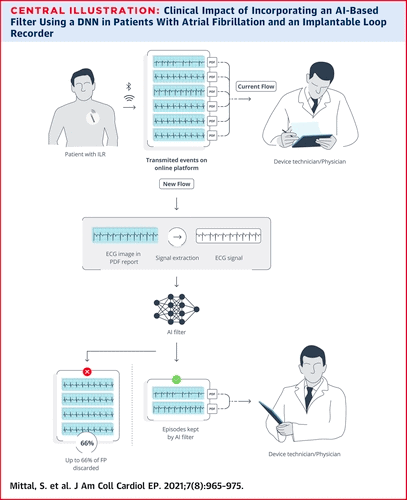By Suneet Mittal et al
The purpose of this study was to determine whether incorporation of a 2-part artificial intelligence (AI) filter can improve the positive predictive value (PPV) of implantable loop recorder (ILR)–detected atrial fibrillation (AF) episodes.
1500 AF episodes were evaluated from patients with cryptogenic stroke or known AF who underwent ILR implantation. Each episode was annotated as either a true or false AF episode to determine the PPV. A 2-part AI-based filter (Cardiologs, Paris, France) was then employed using a deep neural network (DNN) for AF detection. The impact of this DNN filter on the PPV was then assessed.
The cohort included 425 patients (mean age 69 ± 10 years; 62% men) with an ILR. After excluding 17 (1.1%) uninterpretable electrocardiograms, 800 (53.9%) of the remaining 1,483 episodes were manually adjudicated to represent an actual atrial arrhythmia. The PPV of ILR-detected AF episodes was 53.9% (95% confidence interval (CI): 51.4% to 56.5%), which increased to 74.5% (95% CI: 71.8% to 77.0%; p < 0.001) following use of the DNN filter. The increase was greatest for AF episodes ≤30 min. The most common reason for a false-positive AF event was premature atrial contractions. There was a negligible failure to identify true AF episodes.
Despite currently available ILR programming options, designed to maximize PPV in a given population, false-positive AF episodes remain common. An AI-based solution may significantly reduce the time and effort needed to adjudicate these false-positive events.
Read more at the Journal of the American College of Cardiology
Reference
Mittal S, Oliveros S, Li J, Barroyer T, Henry C, Gardella C. AI Filter Improves Positive Predictive Value of Atrial Fibrillation Detection by an Implantable Loop Recorder. JACC Clin Electrophysiol. 2021 Feb 8:S2405-500X(20)31298-6. doi: 10.1016/j.jacep.2020.12.006. Epub ahead of print. PMID: 33582099.

